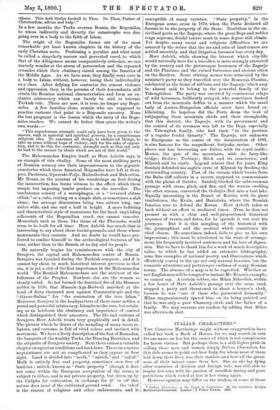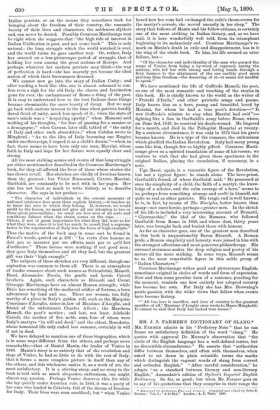ITALIAN CHARACTERS.*
THE Countess Martinengo might without exaggeration have called her book a Book of Heroes, for we may search in vain for one name on her list the owner of which is not conspicuous for heroic virtues. But perhaps there is a still higher pride in calling these men and women simply Italian Characters, for this title seems to point out how Italy, for whom most of them laid down their lives, was their mother, and how all the great- ness of their nature came from her. She, as she lay dying after centuries of division and foreign rule, was still able to inspire her sons with the passion of unselfish daring and pure patriotism which ended at last in her rising again.
However opinion may differ on the wisdom of some of these
• Italian Characters in the Epoch of Unification. By the Countess Evelyn.. Martinengo Cesaresco. London : T. Fisher nwin. 1890.
Italian patriots, or on the means they sometimes took for bringing about the freedom of their country, the romantic beauty of their lives and characters, the nobleness ofl their end, can never be denied. Possibly Countess Martinengo may be right when she suggests that "the high tide of interest in Italian Unification is past, and not come back." This is only natural ; the long struggle which the world watched is over, and the world turns its gaze another way. Or, rather, Italy has entered on a less picturesque period of struggle, that of holding her own among the great nations of Europe. And perhaps, whatever her modern patriots may think—the way of perfection is hard—she has scarcely yet become the ideal nation of which their forerunners dreamed.
We cannot now go into the story of Italian Unity ; and after reading a book like this, one is almost ashamed to con- fess even a sigh for the old Italy, the charm and fascination gone for ever, the enchantment of Rome a thing of the past. It is easy to understand how to the best Italians these things
became abominable, the mere beauty of decay. But we may go back with curious interest to the time when patriots hardly dared think of unity, much less speak of it ; when the state of
men's minds was a "despairing apathy ;" when Manzoni said nothing of his thoughts, " for fear of passing for a maniac or a demagogue;" when Cavour, later still, talked of " the unity of Italy and other such absurdities ;" when Cobden wrote to Minghetti " As to the idea of Italy becoming one Empire under one Sovereign, I regard it as a child's dream,"—when, in fact, there seems to have been only one man, Mazzini, whose faith in Italy and hope for her future were equally clear and strong.
All the most striking scenes and events of that long struggle are either mentioned or described in the Countess Martinengo's book, for they all affected the lives of those whose stories she has chosen to tell. Her sketches are chiefly of lives less known than the greatest : but Victor Emmanuel, Cavour, Mazzini, Garibaldi, are constantly to be met with in her pages. Her aim has not been so much to write history, as to describe character. She says in her preface :—
" The character of individuals in the crucial moments of national existence does more than explain history,—it teaches us to know the race to which they belong. If, however, we would profit by the lesson, we must not give all our attention to two or three great personalities ; we must see how men of all sorts and conditions behave when the strain comes on the rope Others, if not of great importance for what they did, were so for what they were, since it is not too much to assert that a supreme factor in the regeneration of Italy was the force of high example."
Thus the motive of the book may in some sort be found in Pascal's words, quoted on p. 202: " La vertu d'un homme ne doit pas se mesurer par sex efforts, mais par ce qu'il fait d'ordinaire." These heroes were nothing if not good men ; they gave Italy themselves and all they had, but the greatest gift was their "high example."
The subjects of these sketches are very different, though one aspiration was common to them all. There is an atmosphere of tender romance about such names as Settembrini, Mameli, Bassi, Alessandro Poetic), the gentle and heroic Cairoli brothers. Again, such characters as Ricasoli and Count Giuseppe Martinengo have an almost Roman strength ; while Bixio has something of the mediaeval soldier of fortune, a born adventurer by land and sea. There are women, too, fully
worthy of a place in Italy's golden roll, such as the Marquise Constance d'Azeglio, sister-in-law of Massimo d'Azeglio, and friend of the unfortunate Charles Albert ; the Marchesa Mameli, the poet's mother ; and last, not least, Adelaide
Cairoli, the mother of five noble sons, four of whom were Italy's martyrs " in will and deed," and the eldest, Benedetto, whose honoured life only ended last summer, certainly in will if not in deed.
We have delayed to mention one of these biographies, which is in some ways different from the others, and perhaps more remarkable,—that of Daniel Manin, the leader of Venice in 1848. Manin's story is so entirely that of the revolution and
siege of Venice, he had so little to do with the rest of Italy, that it forms a more complete picture in itself than any of
the others, and this wholeness makes it, as a work of art, the most satisfactory. It is a stirring story, and no story in the book is told with so much eloquence, enthusiasm, one might almost say, passion. Perhaps Venice deserves this, for while she lay quietly under Austrian rule, in 1844, it was a party of her sons who landed in Calabria, full of the dream of freedom for Italy. Their lives were soon sacrificed; but " when Venice heard how her sons had exchanged the exile's thorn-crown for the martyr's aureole, she moved uneasily in her sleep." The story that follows of Manin and his fellow-citizens, is certainly one of the most striking in Italian history, and, as we have said, it is here wonderfully well told, from its triumphant beginning to its melancholy end. Countess Martinengo's re- mark on Manin's death in exile and disappointment, has in it
the ring of the whole book. To him, his life seemed an utter failure, but— "Of the character and individuality of the man who purged the name of Venice from being a by-word of reproach among the nations, who led her with strong and loving hands through a fiery furnace to the attainment of the one earthly good more precious than freedom—the deserving of it—it seems not needful to speak."
We have mentioned the life of Goffredo Mameli, the poet, as one of the most romantic and touching of the stories in this book. He is chiefly known to the world as the writer of " Fratelli d'Italia," and other patriotic songs and poems. Italy knows him as a hero, young and beautiful, loved by
Mazzini, for whom he had a true poet's devotion—(" It was Goffredo's mission to sing what Mazzini had said")—
fighting like a lion in Garibaldi's army before Rome, where, on June 3rd, 1849, he received his death-wound. He lingered for a month, and died in the Pellegrini Hospital at twenty. By a curious circumstance, it was only in 1872 that his grave became known. He is a type of the romance, the enthusiasm which glorified the Italian Revolution. Italy had many young sons like him, though few so highly gifted. Countess Marti. nengo gives us a spirited translation of some of his verses; we venture to wish that she had given these specimens in the original Italian, placing the translation, if necessary, in a note.
Ugo Bassi, again, is a romantic figure of the Revolution, but not a typical figure : he stands alone. The hero-priest, Garibaldi's friend, of whom Garibaldi said, " He possessed at once the simplicity of a child, the faith of a martyr, the know- ledge of a scholar, and the calm courage of a hero," seems to us, perhaps from something strange and exalte in himself, not quite so real as other patriots. His tragic end is well known ; he is, in fact, by means of The Disciples, better known than
many—not more heroic, perhaps—greater men. In the sketch of his life is included a very interesting account of Brunetti, " Cicerua,cchio," the idol of the Romans, who followed Garibaldi from Rome in 1849, and whose dust, thirty years later, was brought back and buried there with honour.
As far as character goes, one of the greatest men described in this book is unquestionably Baron Ricasoli. A Roman pride, a Roman simplicity and honesty, were joined in him with the strongest affections and most generous philanthropy. His outward sternness makes the deep religion and poetry of his nature all the more striking. In some ways, Ricasoli seems to us the most remarkable figure in this noble group of " Italian Characters."
Countess Martinengo writes good and picturesque English, sometimes original in choice of words and form of expression.
Now and then some peculiar turn of a sentence, puzzling for the moment, reminds one how entirely her adopted country has become her own. For Italy she has Mrs. Browning's poetic passion, with the wider views that follow when events have become history.
"' All true love is sacrifice, and love of country is the greatest sacrifice of all,' Massimo d'Azeglio once wrote to Marco Minghetti. It cannot be said that Italy has lacked true lovers."







































 Previous page
Previous page